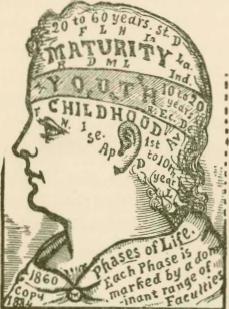PHASES OF LIFE. The life of a human being, after birth, is marked by three great phases of develop
ment-Childhood, Youth, and Maturity. These same phases mark the life of each nation and of the human .race as a whole. This is what modern science proves and teaches. Each phase is well-marked at its middle period, but at the lines of j unction they insensibly glide into each other. These phases display the suc
cessive unfolkling and rule of faculties from the base to the top of the brain, and from the back to the front.
During the period of Infancy and Childhood, from the first to the tenth year, the groups of impulsion, sensation and perception rule the character. The child is restless, impulsive, sensitive and perceptive. The brain easily receives impressions in infancy. But most of these are indistinct and soon replaced by others. The child learns almost wholly through sensation and perception. It constantly asks questions, vet reasons from narrow and ill-observed premises. Although the organs of the top head are often large in childhood, yet they are dormant and not roused into activity until later.
Morality involves the complex relations of society, and the child does not realize these relations. His
PHASES Ot• LIVE. 15
life is simple. It is not easy to appeal to his moral sense. The motives placed before him must be such as will directly reach his senses and his limited experience. The child is selfish without having the sense of ownership. He does not perceive that it is wrong to take what belongs to others.
The student of history sees how these childish traits apply in a striking way to the early history of nations and of the human race.
PHASE of YOUTH. The range of organs which rule in this period from the tenth to the twentieth year, includes the groups of memory, familism and defense. Through observation, memory and language, the youth acquires stores of knowledge; through reverence, parental love and patriotism, lie learns some of his relations to his superiors, his equals and his inferiors; and through the faculties of economy, defense and reserve, lie gets an idea of property and personal rights.
In the national phase of youth we find that literature, as such, receives its first great impulses of growth. The art of verbal expression outstrips the gains in actual knowledge and the people mistake the skilful clothing of words for the vital form of truth itself, as we see in the Platonic period of Grecian literature. "They knew but little, yet knew how to express that little extremely well. "
THE PHASE OF MATURITY reaches from twenty to sixty years. In this period the high faculties of integrity, self-control, sexual, fraternal and religious love and hope, with reason and foresight, come into prominence and rule the character The crude ideas of childhood and youth are displaced . by -exact =
HISTORIC GROWTH OP MAN.
